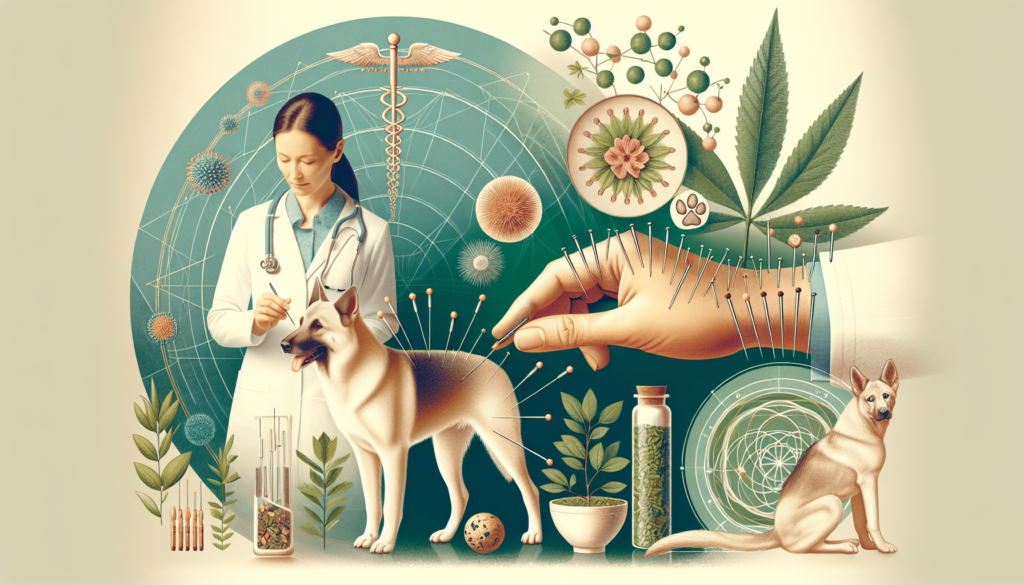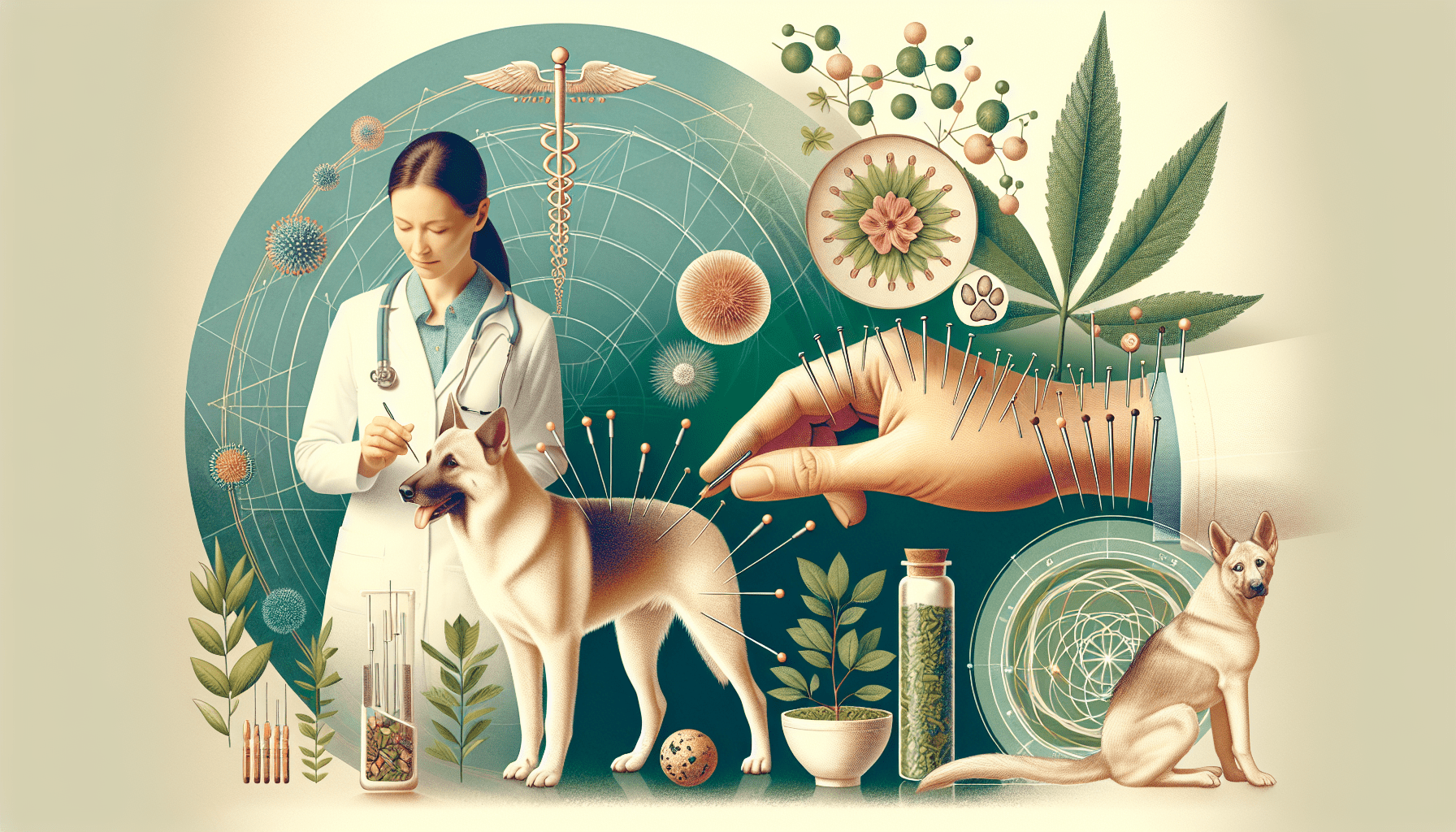In our fast-paced world, where everyone is looking for holistic and natural solutions, it’s no wonder that the field of veterinary medicine is also embracing the concept of integrative care. Integrative veterinary medicine combines the best of traditional Western medicine with alternative therapies like acupuncture, herbal medicine, and chiropractic. This unique approach not only treats the symptoms but also addresses the underlying causes of your pet’s health issues. By taking a comprehensive approach, integrative veterinary medicine provides a range of benefits, from reduced reliance on medications to improved overall well-being for your furry companions. Say goodbye to one-size-fits-all treatments and see the amazing benefits that integrative veterinary medicine can offer.

Enhanced Holistic Approach
When it comes to treating animals, a holistic approach that takes into account both their physical and emotional well-being is crucial. This is where the benefits of integrating traditional veterinary medicine with complementary therapies come into play. By combining the best of both worlds, veterinarians are able to provide a more comprehensive and well-rounded approach to animal care. By treating the whole animal, addressing core health issues, and providing personalized treatment plans, an enhanced holistic approach can truly make a difference in the lives of our cherished pets.
Complementary Therapies
Complementary therapies are an essential component of integrative veterinary medicine. These therapies include acupuncture, herbal medicine, homeopathy, chiropractic care, and physical therapy. Each of these modalities has its own unique set of benefits and can play a significant role in improving the overall well-being of our furry friends. Acupuncture, for example, can help alleviate pain and discomfort, improve circulation, and promote relaxation. Herbal medicine can provide natural remedies for various conditions, while homeopathy utilizes highly diluted substances to stimulate the body’s natural healing responses. Chiropractic care focuses on the alignment of the spine and nervous system, and physical therapy can aid in rehabilitation and muscle strengthening. By incorporating these complementary therapies alongside traditional veterinary care, we can optimize treatment outcomes and improve the lives of our beloved pets.
Improved Treatment Outcomes
One of the key benefits of integrating traditional and complementary therapies is the improved treatment outcomes that result. By utilizing complementary therapies, veterinarians can achieve a range of positive effects on animal health. These include alleviating pain and discomfort, reducing the side effects of medications, enhancing the immune system, promoting faster healing, and managing chronic conditions. Instead of relying solely on medications, which may have their own limitations and side effects, complementary therapies offer alternative and often more natural approaches that can provide relief and support to animals undergoing treatment. By targeting the underlying causes of health issues and supporting the body’s own healing mechanisms, integrative veterinary medicine can lead to better treatment outcomes and improved quality of life for our furry companions.
Preventive Care
Prevention is always better than cure, and this principle holds true in veterinary medicine as well. Integrative veterinary medicine places a strong emphasis on preventive care, with the goal of early detection of health issues, improving overall wellness, reducing the risk of diseases, and ultimately leading to long-term cost savings. Through regular wellness exams, screenings, and proactive healthcare strategies, veterinarians can identify potential health problems at an early stage and take appropriate measures to prevent them from escalating. This proactive approach not only helps keep our pets healthier and happier, but it also reduces the need for more costly and invasive treatments that may be required in the later stages of diseases. By investing in preventive care, pet owners can ensure the well-being of their furry companions and enjoy the peace of mind that comes with early detection and intervention.

Reduced Stress and Anxiety
Stress and anxiety can take a toll on the well-being of both animals and humans alike. In veterinary medicine, reducing stress and anxiety is of utmost importance, as it can have a significant impact on the recovery and overall wellness of our pets. Integrative veterinary medicine helps alleviate stress and anxiety in a number of ways. Firstly, by providing a relaxed and comfortable environment, animals feel more at ease during their veterinary visits. This, in turn, reduces their stress levels and makes the examination and treatment process more manageable. Secondly, complementary therapies often involve less invasive procedures, which can be less overwhelming for animals. Additionally, the individualized attention given during these therapies helps create a sense of security and reassurance for both the animal and their owner. Lastly, by promoting emotional well-being through holistic approaches, animals experience improved mental health and resilience. By addressing stress and anxiety through integrative veterinary medicine, we can create a more positive and calming experience for our furry friends.
Collaborative Care
Integrative veterinary medicine also fosters a collaborative approach between veterinarians, creating a synergy that enhances the care provided to animals. Open communication between veterinarians is essential in coordinating treatment plans and ensuring the best possible outcomes. By sharing information, experiences, and expertise, veterinarians can make more informed decisions and provide the most effective treatment strategies for their patients. This collaborative approach allows for a seamless integration of both traditional and complementary therapies and combines the resources and knowledge of different veterinary professionals. By working together, veterinarians can provide comprehensive and well-rounded care to animals, taking advantage of the strengths and benefits of each modality.
Supporting Conventional Medicine
Integrative veterinary medicine is not meant to replace traditional veterinary care; rather, it works hand in hand to support and enhance it. By seamlessly integrating complementary therapies with traditional veterinary medicine, the efficacy of medications can be maximized, negative interactions can be minimized, and support can be provided for surgical procedures. Complementary therapies can enhance the effects of medications by promoting their absorption, improving circulation, and supporting the body’s response to treatment. They can also help mitigate any potential side effects that may arise from the use of medications. Furthermore, complementary therapies can prepare animals for surgery by optimizing their overall health and reducing stress levels, thus increasing the likelihood of a successful outcome. By supporting conventional medicine, integrative veterinary medicine provides a more comprehensive and well-coordinated approach to animal care.
Widening Treatment Options
Sometimes conventional veterinary care alone may not provide the desired results, especially for certain non-responsive conditions. Integrative veterinary medicine offers alternative methods and modalities to explore, increasing the treatment options available for animals. Whether it’s blending different therapies to create a customized treatment plan or tailoring treatment to the individual needs of each animal, integrative veterinary medicine provides comprehensive solutions for complex cases. By expanding the treatment options, veterinarians can target conditions from multiple angles, potentially finding greater success where traditional approaches have fallen short. This ability to adapt and tailor treatment plans allows for a more personalized and effective approach to veterinary care, leading to improved outcomes for our beloved pets.
Enhanced Client Satisfaction
Integrative veterinary medicine places a strong emphasis on individualized attention and care, which translates into enhanced client satisfaction. Pet owners play an integral role in the treatment process, and by involving them in decision-making and providing them with a deeper understanding of the treatment plans, client satisfaction is greatly increased. Through personalized treatment plans and education, pet owners feel empowered and actively involved in their furry companion’s well-being. Increased involvement not only improves client satisfaction but also leads to better compliance with treatment recommendations and overall better outcomes for the animals. By focusing on client satisfaction through individualized attention and care, integrative veterinary medicine strengthens the trust and bond between pet owners and veterinarians, ultimately benefiting the animals under their care.
Growing Popularity
Integrative veterinary medicine is experiencing a surge in popularity and acceptance within the veterinary community and among pet owners. As more veterinarians recognize the benefits of integrating complementary therapies into their practice, the acceptance and integration of these modalities into mainstream veterinary care increase. Positive client testimonials further solidify the value and effectiveness of integrative veterinary medicine, as pet owners share their stories of improved outcomes and overall well-being for their furry friends. The availability and accessibility of integrative veterinary medicine are also expanding, ensuring that more animals have access to these beneficial treatments. As the popularity of integrative veterinary medicine continues to grow, more animals will be able to benefit from the holistic approach and comprehensive care it provides.
In conclusion, the integration of traditional and complementary therapies in veterinary medicine offers a range of benefits that ultimately improve the well-being of animals. From addressing the whole animal and core health issues to providing personalized treatment plans and enhancing treatment outcomes, integrative veterinary medicine takes a holistic approach to animal care. By utilizing complementary therapies, veterinarians can reduce stress and anxiety, support conventional medicine, widen treatment options, and enhance client satisfaction. With growing acceptance within the veterinary community and positive client testimonials, integrative veterinary medicine is poised to play an increasingly important role in mainstream veterinary care. Through collaboration, compassion, and an unwavering commitment to the well-being of our furry friends, integrative veterinary medicine is revolutionizing the way we care for and treat our beloved pets.

